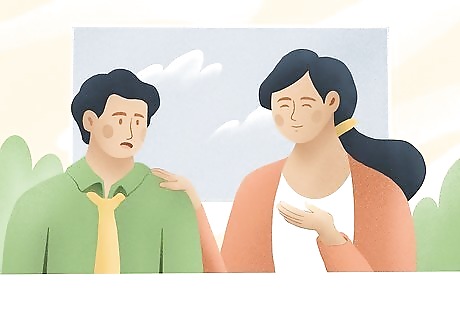
views
Listen more and speak less.

Listen when a person wants to discuss a difficult situation with you. Realize that many other people around them may not be listening and what they are looking for is an open, all-ears person who will say nothing unless advised to do so. Sometimes your friend or someone you barely know just needs someone to talk to. It is best to just listen because some people don't want to discuss it back and forth, sometimes they just need people to Listen, that is it, listen and not say anything because it could be a sensitive subject or they just don't want a full-on conversation.
Wait to speak.

Once they are finished talking, ask them if you can say something. Say that you feel that you have a better understanding of where they are coming from after listening to their perspective.
Acknowledge their experience.

Do not attempt to usurp their memory of the matter. Also, don't try to make it seem as if your own experience is better, worse, stronger, or deeper. Instead, acknowledge their experience for what it is and make it clear that you've heard and that you are remaining open-minded. If it seems appropriate, you can say something along the lines of: "I feel for you. Nobody deserves to be treated that way." Or, "I am here for you and I am so sorry that happened. I would be hurt if someone spoke to me like that/did that to me too. I am here for you." Reader Poll: We asked 467 wikiHow readers, and 63% of them agreed that the best way to respond when someone talks to you about their personal issues is to show empathy and offer support. [Take Poll]
Remind yourself at all times that everyone has challenges to face.

Everyone has struggles that they're dealing with. Indeed, there is a wonderful saying that: "Be kind, for everyone you meet is fighting a battle you know nothing about." This is an acknowledgment that every person has something challenging going on deep inside that is impossible to see from the surface.
Let people be vulnerable.

Social requirements make people feel the need to be tough and not air their hardships. This causes people to bottle everything up and put on a front in public. This can also lead to seeming more stubborn, difficult, or uncaring than is really the case, because it's all about seeming to be coping. Give people the space to let down their defenses and to give their side of the story a chance to be heard. Try to practice empathy by imagining what another person is thinking or feeling. Think about a person's past experiences, as well as their past, present, and future concerns.
Be accepting.

Everyone makes mistakes. Things happen that are not purposefully wrong but which were out of the person's control. Most people try the hardest that they can to do things the right way, to overcome obstacles, and to be good people. Sometimes the difference between turning "to the dark side" and no longer caring or remaining hopeful and continuing to strive resides in the moment when a person, such as yourself, steps in and says "It's okay, it was a mistake, you have learned and will now be able to move on." So, the next time someone goes through something terrible, think first, and never make judgments about their mistakes because everyone makes them. Be sensitive and listen.



















Comments
0 comment